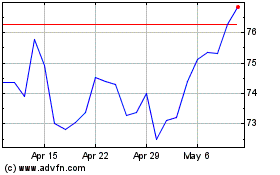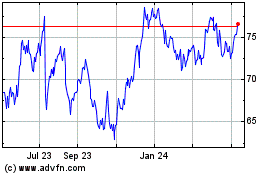BNY Mellon to Charge for Deposits - Analyst Blog
August 05 2011 - 1:13PM
Zacks
On Thursday, The Bank of New York Mellon
Corporation (BK) announced to charge fee on cash
deposits of institutional investors following the surge in deposit
balance with the banks. Investors having accounts with average
deposit of over $50 million in the bank would come under the
purview of charges.
BNY Mellon will be charging a 13 basis points annual fee on
excess deposits and an extra fee if short-term Treasury bills give
negative yields. Yesterday, yields on one-month Treasury bills
plummeted as low as -0.0102, the lowest level since January 2010,
due to financial markets turmoil across the world.
In general terms, customers are being paid interest on their
deposits by the banks and the banks pay FDIC insurance premiums for
holding deposits. With the rising balance in deposits, insurance
premium payments for banks are expected to rise.
Therefore, with short-term interest rates going near zero, and
escalating FDIC insurance premiums on deposits, the banks will be
affected if they hold large amounts of cash on their balance
sheets. Therefore, BNY Mellon has come up with charging fees on
deposits.
Due to the volatile nature of stock and bond markets, investors
are seeking safe investments through bank deposits. Moreover, the
delay in reaching a conclusion due to an increase in the country’s
debt ceiling between U.S. Congress and White House added fuel to
the fire. Therefore, investors moved to the banks for deposits,
which increased balance in banks significantly` during the last
month.
BNY Mellon totaled $26.3 trillion of assets under custody and
administration as of June 30, 2011, up 3% sequentially and 21% year
over year. Increasing deposits in BNY Mellon indicates that the
companies are maintaining higher cash balances following the recent
financial and economic imbalance and further, investment managers
are selling off risky assets and putting proceeds into bank
accounts to meet investor demands during redemption.
Among other banks, the largest U.S. bank, Bank of
America Corporation (BAC) also recorded surge in deposits
with $1.04 trillion at the end of the second quarter of 2011, up
18% from the prior quarter and 64% from the prior-year year.
Moreover, among BNY Mellon's competitors, State Street
Corp. (STT) and Northern Trust
Corporation (NTRS) has yet not come up with the same fee
charges.
BNY Mellon intimated clients that the fees imposed on excess
deposits were to preserve the excellence and strength of its
balance sheet and large institutional clients having extraordinary
levels of cash would be affected. Further, the bank stated the
obligatory fees charge plan will be withdrawn once markets gains
stability, which would tend down the deposits.
BNY Mellon currently retains its Zacks #4 Rank, which translates
to a short-term Sell rating. However, in the absence of any
significant positive or negative catalyst, we maintain a long-term
Neutral recommendation on the stock.
BANK OF AMER CP (BAC): Free Stock Analysis Report
BANK OF NY MELL (BK): Free Stock Analysis Report
NORTHERN TRUST (NTRS): Free Stock Analysis Report
STATE ST CORP (STT): Free Stock Analysis Report
Zacks Investment Research
State Street (NYSE:STT)
Historical Stock Chart
From Jun 2024 to Jul 2024

State Street (NYSE:STT)
Historical Stock Chart
From Jul 2023 to Jul 2024
